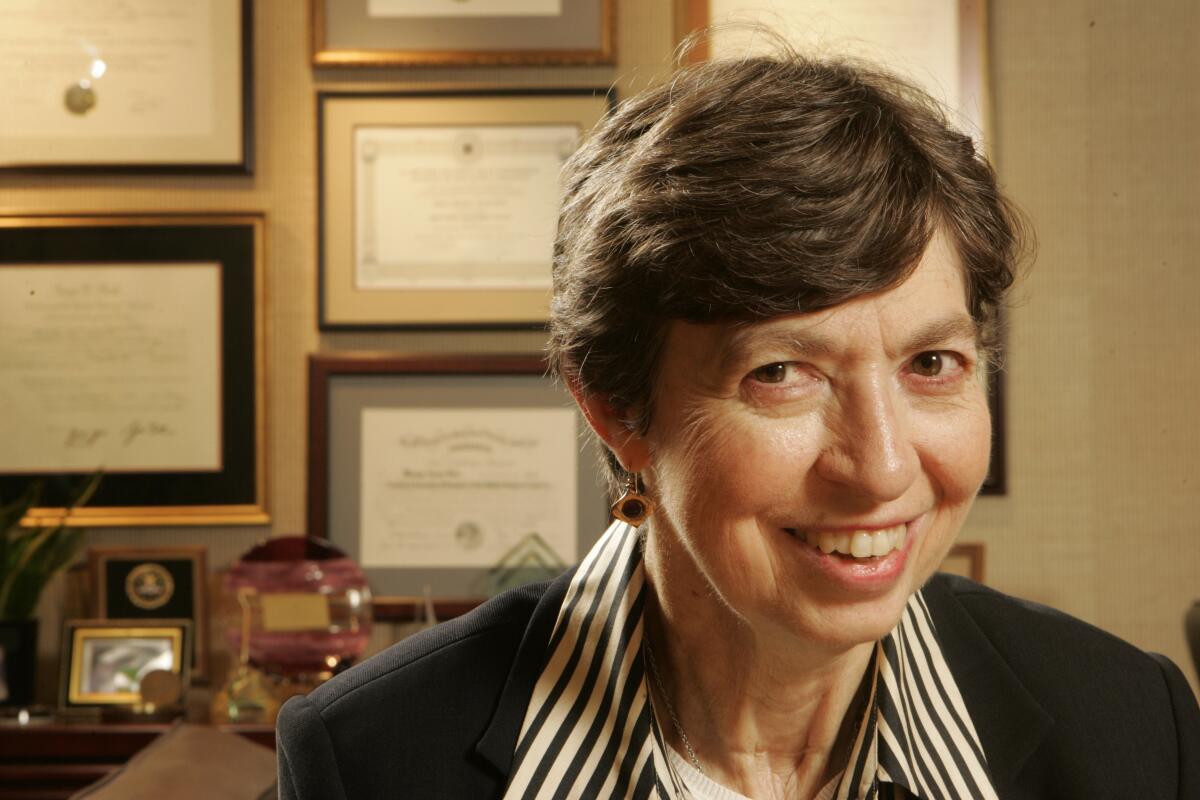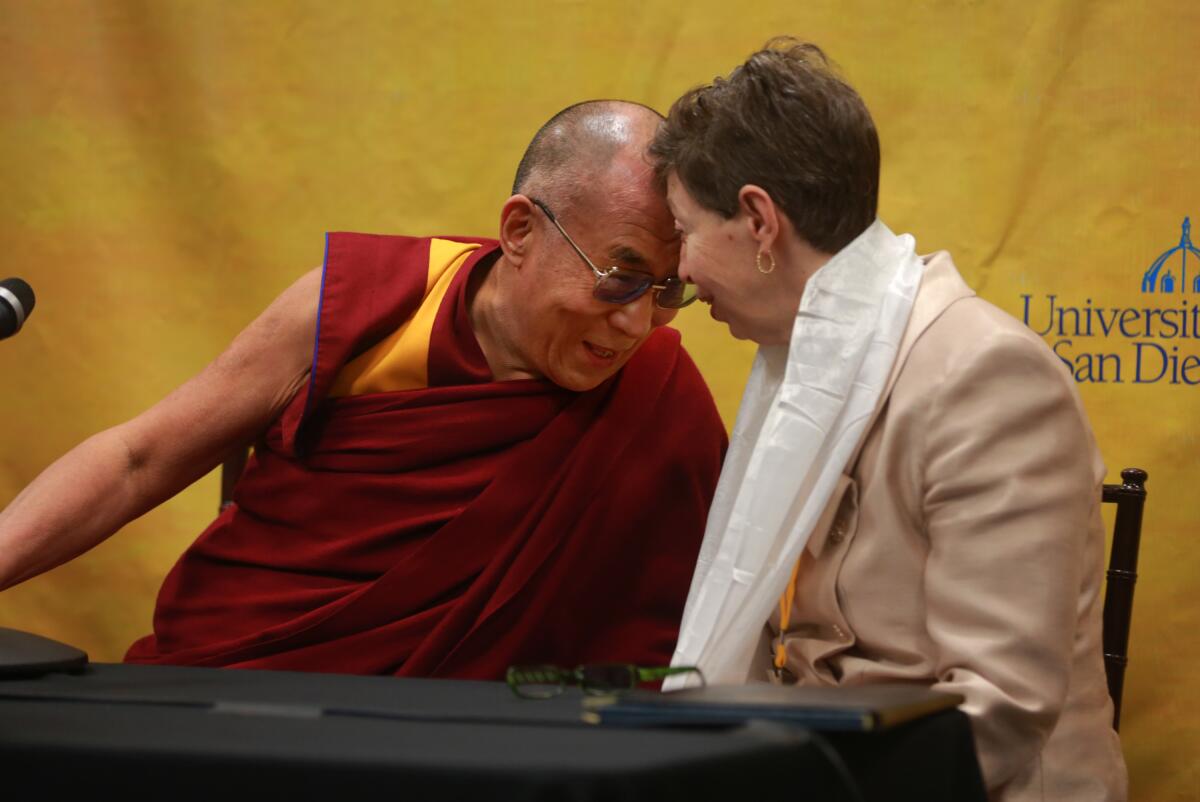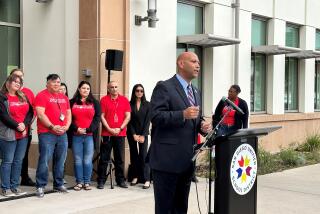Marye Anne Fox, pioneering chancellor at UC San Diego, dies at 73

Marye Anne Fox, a tough-minded chemist who guided UC San Diego through eight often difficult years of growth as the school’s chancellor and who was awarded the National Medal of Science for her insights about sustainable energy, died Sunday at the age of 73.
Fox passed away at her home in Austin, Texas, after a long illness, according to a statement from North Carolina State University, where she served as chancellor before moving to La Jolla.
She was the first female chancellor at NC State and the first woman to hold that position as a permanent appointee at UCSD. The titles meant a great deal to Fox, who spent much of her life promoting the interests of girls and women.
“One of the first things she did after she arrived here was accept an invitation to a fundraiser thrown by the Girl Scouts,” said Mary Walshok, associate vice chancellor of public programs at UCSD.
“She wanted to build talent in girls — and grit. A few months later, she convened a gathering of women faculty and deans, at a time when there wasn’t many of them, and spoke about the need to hang in there. She had grit and wanted others to have it, too.”
It was a trait that Fox often needed.
She earned a bachelor’s degree in chemistry at Notre Dame in 1969 and a doctorate in the same field at Dartmouth in 1974. It was an era when women were not widely represented in science, and often not broadly welcomed.
But things were changing. The government started to more strongly encourage women to enter science after the Soviet Union beat the U.S. in placing the first artificial satellite in space in 1957, triggering the space race.
The message resonated with Fox, who loved chemistry.
“Chemistry was logical ... (It) can be easily understood on basic principles, and those principles can be easily established in the laboratory,” Fox told the Union-Tribune in 2010.
“Biology I found messy. Physics I found too mathematical,” she said. “So chemistry was like the ‘Three Bears,’ just right.”
She enjoyed her Notre Dame years. But things turned tough at Dartmouth, after she became pregnant.
“I stayed home with the baby all morning and worked all night,” Fox told the Union-Tribune during an interview in 2010. “My mentor, David Lemal, sometimes stayed with me so I wouldn’t be so alone, so it would be safe.
“My mother expected me to quit science. She said that I should stay home and raise my children. It was David who said, ‘She has possibilities.’”

Fox went on to become a chemistry professor at the University of Texas, where she rose to the position of vice chancellor of research. She also served as a science advisor to George W. Bush while he was the state’s governor.
In 1994, her research, policy work and bridge-building with industry earned her election to the National Academy of Sciences, which was founded during the Lincoln administration to advise the country on science and technology. At the time, fewer than 100 of the academy’s 1,700 members were women.
Barely four years later Fox was named chancellor at NC State, a sometimes overlooked cog in the so-called “Research Triangle” region of North Carolina.
She was instrumental in getting the state’s legislature to approve a $3.1-billion referendum to support higher education. And she helped push through an expansion of the Atlantic Coast Conference, which was a very big deal in a state that’s deeply passionate about college sports.
“What stands out to me is that Marye Anne perpetuated the notion that NC State needed to raise its expectations as a premier academic institution,” Randy Woodson, the school’s current chancellor, said in a statement.
“Her leadership changed how we think of ourselves as a university and elevated NC State’s stature as a world-class academic institution.”
Her work caught the attention of the University of California Board of Regents, which named her chancellor at UC San Diego in 2004, when the campus had 24,663 students. The figure grew by 3,631 by the time she stepped down in 2012. The school’s research funding also surpassed the $1-billion level, making UCSD among the 10 largest research schools in the country.
Not everything went well. Like other UC campuses, the school had to deal with cuts in state funding and tuition hikes. And Fox drew sharp criticism from some students for her response to the “Compton Cookout,” a student party in 2010 that was advertised as a way for attendees to “experience the various elements of life in the ghetto.” The theme was meant to mock Black History Month.
Fox condemned the party and organized a teach-in to address the situation. But some students said that she didn’t go far enough to deal with what was seen as systemic racism, which remains an issue at UCSD. Last year, many Black students told the Union-Tribune that the campus has failed to do enough to increase Black enrollment, which stood at 2.8% in 2019.
Fox didn’t run from criticism. Faculty say she faced issues — and people — head on. She was known for pressing people to back up their assertions with data, and she could be blunt about it.
Her softer side came out in small and self-deprecating ways. She used to hold events called “Lunch with the Chancellor” in which attendees would be given an old-fashioned lunchbox that carried artwork that depicted Fox in a humorous way.
She didn’t relish mushy moments that involved her own achievements. Fox gave a pained expression in 2010 when she was asked by the Union-Tribune whether she was likely to cry when President Obama presented her with the National Medal of Science. The event was to be held at the White House, where her husband and children would be in attendance.
“I don’t know. Probably I will. I cried at their weddings,” Fox said in a let’s-move-along voice.
She was just as low-key after the White House ceremony, saying, “It was a very special moment for me personally and professionally.
“I was able to bring two grandchildren to see this,” she said. “And it is good to know that the work you’ve done has had a positive impact on society.”
Pradeep Khosla, UCSD’s current chancellor, said Fox’s legacy is rich and lasting.
“Marye Anne Fox was a gifted administrative leader who advocated for lasting change on complex issues,” Khosla said. “She left the campus in a very strong position — ready for growth, poised for continuous innovation, and valued for its contributions to the region, state and world.
“We would not be where we are today without her visionary leadership and steady hand.”
More to Read
Sign up for Essential California
The most important California stories and recommendations in your inbox every morning.
You may occasionally receive promotional content from the Los Angeles Times.











